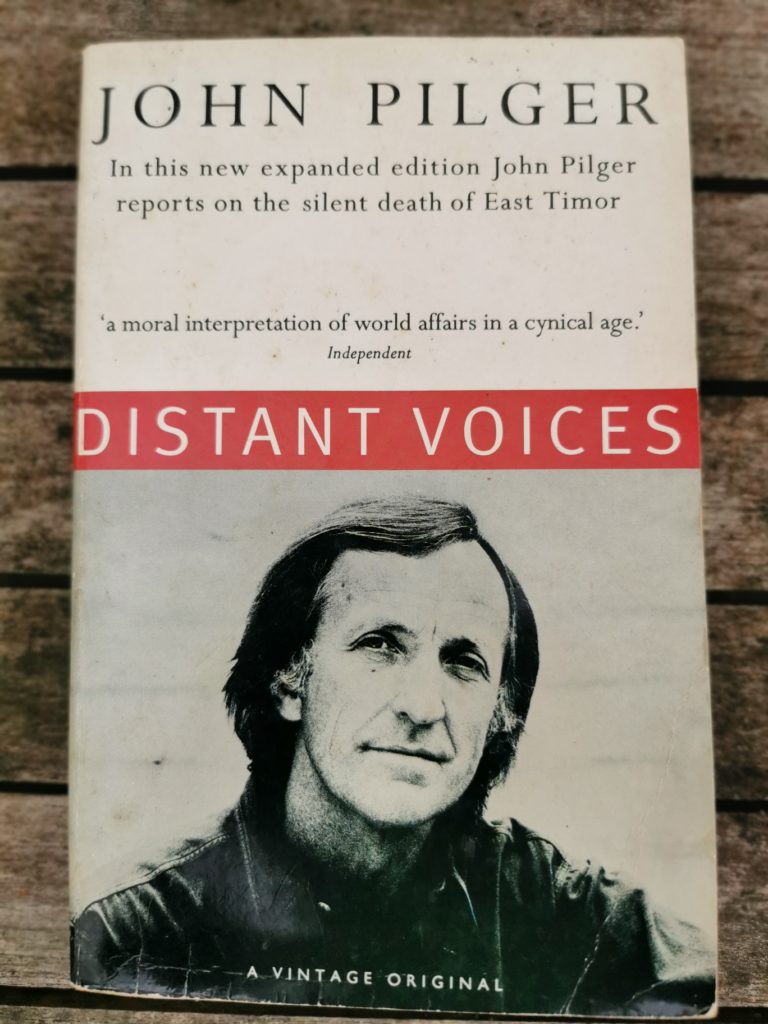“It is not enough for journalists to see themselves as mere messengers without understanding the hidden agendas of the message and the myths that surround it”
This is the strap-line on the X (Twitter) account of John Pilger, who sadly passed away on 30 December 2023.
The world has lost one its kindest, compassionate and committed souls. Pilger shined a light in places few mainstream journalists dare to look. And towards the end of his career few mainstream media outlets would publish his work, beholden as they are to various interests, political and corporate.
I was lucky to see Pilger talk at the Seymour Centre in Sydney. I won’t forget his dignified presence, even when faced with a disruptive heckler. Reading some of Pilger’s collected essays in Distant Voices, his poetic facility with language is immediately striking:
“It’s morning and the sun is like a burning branch, but not here. Just as night consumes winter days in the far northern hemisphere, so dusk is permanent here. Silhouettes drift up the main street, through the smoke and haze. The ashen rain, like the stench, is constant; it stiffens your hair; your eyes weep with it and your throat is coated with it.”
Manila, 1991, Distant Voices, “The Silent War”
This paragraph introduces an article on Philippine’s debt crisis and the knock-on effects on people’s livelihoods. Pilger could have written fiction, but he didn’t need to resort to the ‘imagined’ to hold a mirror to the world. He elevated the portrayal of struggle, the grinding nature of poverty, and our inability (or unwillingness) to eradicate it, into an art form.
A voice of immediate presence
Pilger was born in Bondi and attended Sydney Boy’s High School where he ran a student newspaper. He didn’t attend university but spent four years as a cadet journalist at Australian Consolidated Press. Indeed, my father, who was also a journalist (albeit of a very different sort), didn’t finish university either. And now in the digital era, graduating through formal channels is not necessary to gain an audience.
Communications graduates and cadet journalists should travel to the sites where incidents happen, to the places of suffering and resistance. While this is not always practical (and in the case of Gaza, permissible) it should be encouraged for the authentic perspective primary source material brings.

With the passing of Pilger I remembered the death of another prolific investigative journalist. Andre Vltchek died in Turkey in 2020. But unlike Pilger, Vltchek’s death at the age of 57 passed relatively unnoticed by the mainstream media. Pilger’s long established gravitas and prolific output as a film maker and writer protected him from the ‘conspiracy theorist’ smear.
Like Pilger, Vltcek only put words to paper after visiting the actual places where poverty, war, corruption and repression occur. The democratising effect of social media allows more people to share their views and experiences, and hopefully more of us will leave our comfort zones and write about world affairs from fresh perspectives.
Pilger writes with such power because he is so well read and travelled. Salman Rushdie praises Pilger for his strength in “finding the image, the instant that reveals all: he is a photographer using words instead of a camera.”
First-hand experience is invaluable
Pilger spent a solid part of his career working for established media outlets, with a lengthy stint at Britain’s tabloid the Daily Mirror. It’s this pedigree that protected him from the name calling that other activist journalists cop for questioning prevailing orthodoxies.
We need journalists like Pilger more than ever. A good crop of inquiring minds are providing insightful news and commentary outside the frames of ‘allowed discourse’. These include Aaron Maté, Jimmy Dore, Scott Ritter, Danny Haiphong, Eva Bartlett, Vanessa Beeley and Caitlin Johnstone among others.
While lamenting John Pilger, let’s remember those seasoned challengers of the status quo who are still with us, like Seymour Hersh, Noam Chomsky, and of course Pilger’s friend Julian Assange.
Friedrich Nietzsche stated: “There are no facts, only interpretations”. It would be wise for us to consider which interpretations to follow, and what interests, both personal and political, lie behind each narrative, including our own.
Here is a short list of media sources outside the mainstream bubble. Only by training ourselves to think critically can we discover that no single medium or message can claim to be a source of truth, and indeed, that some are more tainted than others.
Consortium News
Caitlin Johnstone
Media Lens
The Jimmy Dore Show
Pearls and Irritations
The Grayzone

Thanks, Dan. I’m not overly familiar with his work, but I’ve only ever heard him mentioned in reverence. As you say, we need credible, skilled and brave journalists like him more than ever. Vale, John.